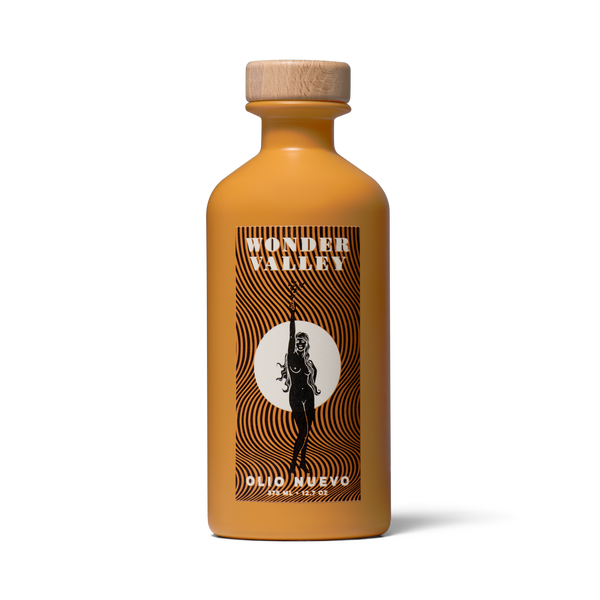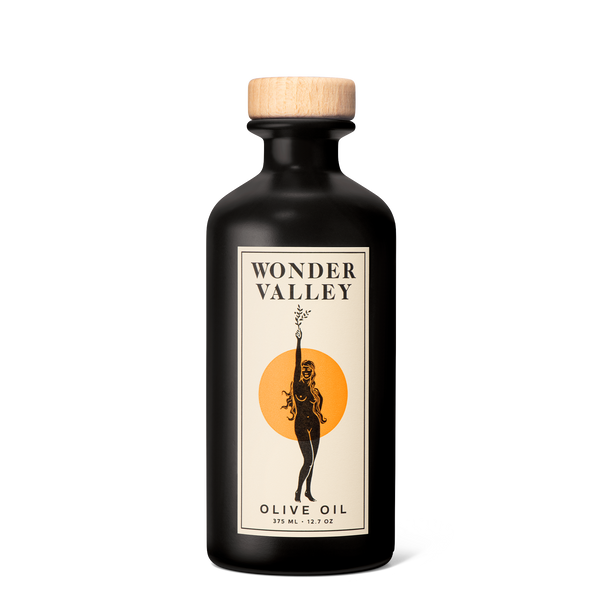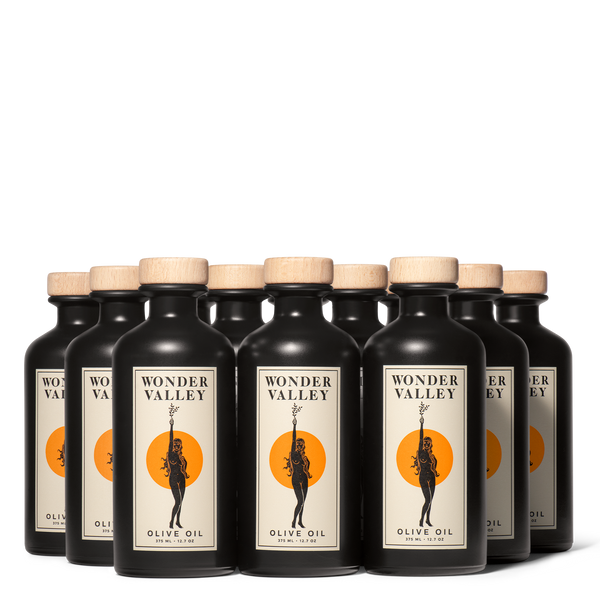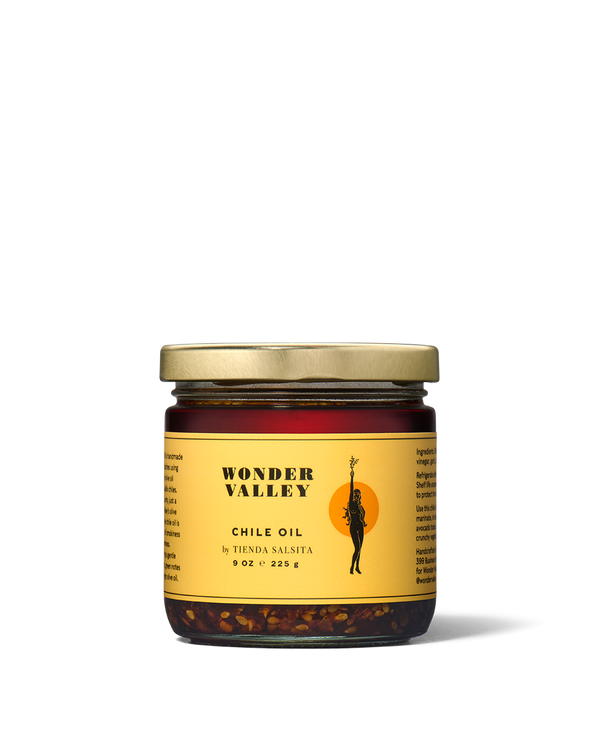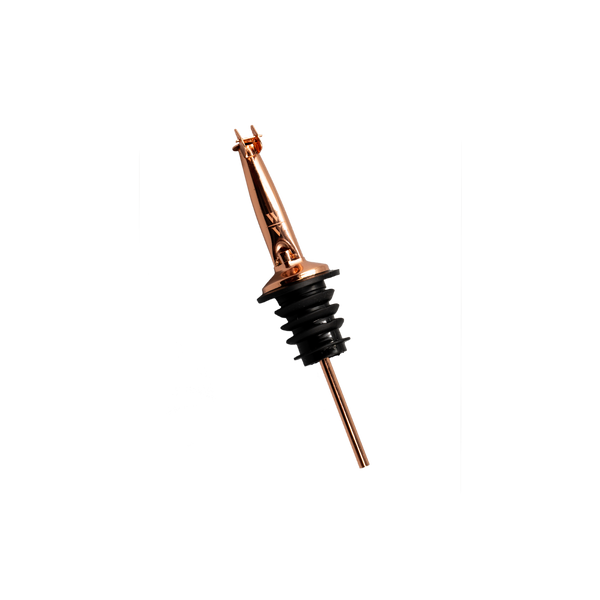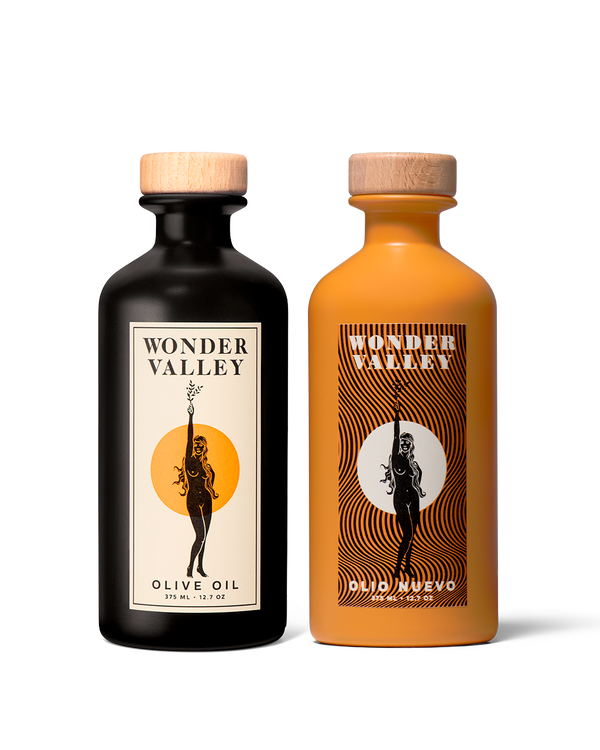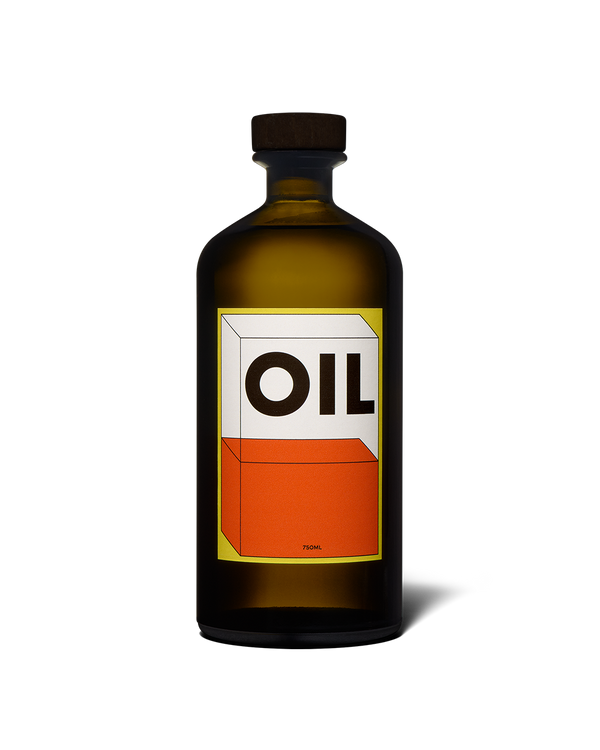Olive Oil
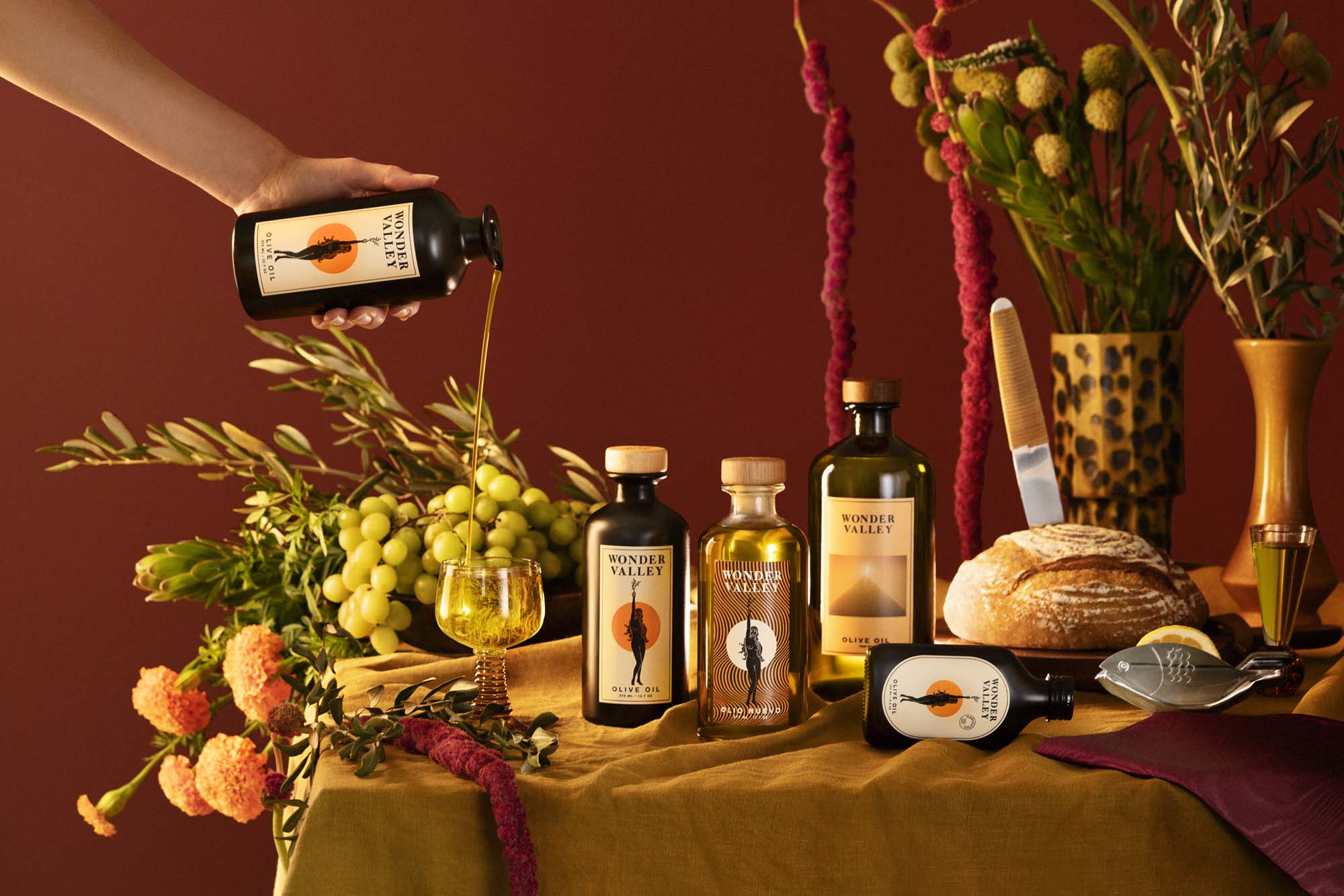
FAQ
Olio Nuevo is a punchy limited-edition finishing oil.
It translates to New Oil, a dual reference to the Italian and Spanish olive varietals we work with. Olio is our limited-edition first pressing at the start of the season. It’s a more labor-intensive process that gives us a lower yield, which is why it is the most precious of our pressings. We do not wholesale this oil, it is only available on our website. The fruit is picked at the earliest possible moment and then cold-pressed immediately, capturing the young olives at the height of their flavor and nutritional value. All of that vigor and freshness translates to an oil that is notably luminous and lively, with a bold flavor that lingers on the tongue. This is not a bottle to let languish in your pantry. Instead, let the olio flow abundantly! The clear glass also gives it a shorter shelf life to intentionally encourage use and enjoyment.
Classic Olive Oil is our all-purpose kitchen companion, perfect for everyday cooking.
Robust but well-balanced, it has a longer shelf life than the Olio because of the matte-black glass bottle. It is well-suited to all kinds of cooking demands and just as delicious, simply mopped up by a crusty loaf of bread.
Both oils are a blend of different varietals and vary year to year. Like any agricultural product, the specific flavor notes shift each year. The small-scale and unique character is what we love about our oil.
Healthy Fats: Extra virgin olive oil is a fantastic source of healthy, good-for-you monounsaturated fat. Studies have shown that a diet rich in EVOO lowers the risk of stroke.
Cardiovascular Health: EVOO is rich in omega-3 fatty acids, essential fatty acids that support the health of your heart, brain, joints, and eyes. They also have the major added benefit of boosting your mood and supporting emotional wellness. The antioxidants in olive oil help to protect blood cholesterol from oxidation and improve the lining of your blood vessels, powerful benefits that may lower your risk of heart disease.
Polyphenols: Over 30 polyphenols are present in extra virgin olive oil, and these powerful free-radical-scavenging antioxidants display anti-cancer and anti-inflammatory properties.
Anti-inflammation: The high antioxidant and oleic fatty acid content in EVOO supports the prevention and reduction of inflammation in the body. This is an important benefit as inflammation is considered the precursor to disease and is a leading factor in types of cancer, arthritis, heart disease, type 2 Diabetes, Alzheimer's disease, and more. Some scientists estimate that the oleocanthal (polyphenol) in 50 mL of extra virgin olive oil has a similar effect as 10% of the adult dosage of ibuprofen.
Polyphenols are a type of antioxidant that fights and neutralizes the effects of free radicals, which are harmful molecules in the body formed by exposure to environmental stressors like air pollution, heavy metal exposure, plastics, chemicals, and UV rays. Polyphenols are a micronutrient that naturally occurs in plants and protects your body’s tissues against oxidative stress and helps to reduce inflammation. Polyphenols are what give olive oil that peppery kick. The more intense the olive oil, the higher the potency of polyphenols. As an olive oil ages and mellows out with time, the polyphenol count will diminish. Using heat and cooking with an extra virgin olive oil will also diminish the polyphenol count. Using olive oil without heat (dressings, as a finishing oil) is the best way to receive the full health benefits. Some of the major polyphenols include oleocanthal, oleuropein, hydroxytyrosol, and tyrosol.
This topic is very dear to us! Before co-founding Wonder Valley, Alison Carroll’s previous role was overseeing the certification of olive oil as ‘extra virgin grade’ for the state of California and acting as an educator and industry advocate. Whether you are buying Wonder Valley or another brand’s olive oil, here are a few tips to ensure you are buying true extra virgin olive oil.
Make sure there’s a harvest date on the bottle and not just an expiration date: this is a fruit juice that doesn’t age well. You must have transparency on when it was pressed to ensure freshness.
Single-origin: Scrutinize the label and see where it is made. Ideally, it should come from a single location or region to ensure quality control. This is a common practice for imported oils: to claim one country on the front, and then the back label reveals the product of x,y, and z countries. A blended oil like this will be challenging to know how fresh it is if it’s true extra virgin grade, or what the shelf life is.
Buy direct or from a reliable source. It’s always great to buy directly from the olive oil producer, but a knowledgeable retailer can talk you through the flavor profile and answer questions.
Buy oil in a glass or aluminum vessel. As plastic gets exposed to light and heat, it can potentially break down into microplastics. Because glass is an impermeable material, it does not react with olive oil, making it a safe storage vessel at any temperature, condition, or period of time. Glass and aluminum, unlike plastic, can be recycled over and over, making it a better material choice for sustainability, as well.
Taste it! If you have an opportunity to taste an olive oil, we encourage you to try it by itself as a shot or by the tablespoon. There are a number of defects that can happen to olive oil that disqualify it as extra virgin grade, each with its own distinct flavor and aroma. But you do not have to be a trained taster to detect these. An extra virgin olive oil will taste like natural things: grass, nuts, fruits, herbs. You can wax poetry about the description of an olive oil! A non-extra virgin grade oil will have notes that taste off and unnatural, some common ones include paraffin wax, brined olives, and spoiled peanut butter. Trust your instincts and get tasting!
24 months from the harvest date for our Classic Olive Oil and 12 months from the harvest date for our Olio Nuevo.
Each bottle is stamped with the harvest month and year on the top. After this time period, the oil will slowly oxidize, and you’ll notice the flavor gets flatter and the oil’s consistency gets a bit thicker. Consuming an oil past this best-by date will not harm you, though you will lose out on the flavor and health benefits as the oil turns from extra virgin to virgin grade with time.
Light, heat, and time are olive oil’s enemies.
Store with a lid or a pour spout with a cap to protect from oxidation.
Store away from direct sunlight and heat, in a pantry or countertop will do, just not directly next to your stove.
Do not store in a fridge or freezer, extreme temperatures will speed oxidation (rancidity).


